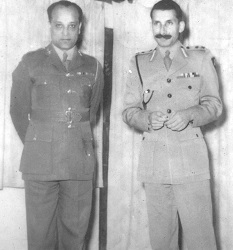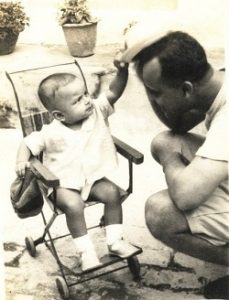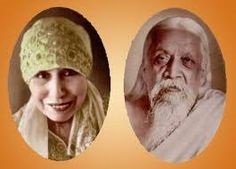As I look back on my past, I feel as if a firm, gentle, powerful Hand had moulded the events of my life so that they formed a pattern.

I was a professional soldier by choice from 1941. In June 1948, while posted at Army Headquarters, New Delhi, I had to visit Avadi, near Madras1. My wife and I had a boy about one year old. He was very interesting, as children of that age are, and I was very attached to him, as new fathers are. So when my wife said she would accompany me, I was very happy. My wife’s cousin sister, visiting us from Calcutta, joined us. We made a nice party and came to Madras.
In Madras, suddenly, my wife said that I could go to Avadi and carry out my official duties, but she, her cousin and our son would go to Pondicherry2. I had little idea about Pondicherry and none about its significance to her. She said she had known about Sri Aurobindo from her student days at Lahore. Without my knowledge, she had arranged a visit to the Ashram through someone who had known her from her childhood. She had the Mother’s permission3.
To me Pondicherry was a foreign territory, a French settlement. I knew nothing of Sri Aurobindo or of the Ashram, nor did I know anything of the Mother. So when my wife told me all this in Madras, my heart sank. I asked her whether it was not too early. You see, we had been married only five years. I thought she was leaving me for good for I knew I had not made the grade to hold her back. She had an interest in our scriptures, had read the Upanishads and many other books. I, on the other hand, had made a “plan” for my life in which I was to begin studying religion from the age of 45. In any case, I used to tell her I was still certain to go to heaven, holding a corner of her sari since she was such a good Hindu and, fortunately for me, my wife.
I dropped her at Pondicherry with my son and her cousin sister, returned the next day via Madras to Avadi and then to my job at Delhi, fairly fed up.
Alone in Delhi, I missed my son and longed to see him. I took leave and got a free ticket to Pondicherry after declaring it as my home-station. I did not inform my wife of my coming.

I reached the Pondicherry railway station at dawn on 15 August 1948. I had no idea of the spiritual significance of the date. I did not find my family in their room, a ground-floor place. I was told that they had gone for “Balcony Darshan” and then directed me to where I should go, having no idea of Balcony Darshan given by the Mother. I saw a gathering of pleasant, cheerful and neatly-dressed men, women and a few children. I saw my son being held by a lady and eagerly picked him up in my arms, and joined the others waiting for the Darshan. In about five minutes I caught a glimpse of a figure in white on one of the balconies. There was an atmosphere of joy and childlike cheerfulness all round. The figure stood for a while and then went inside. The Balcony Darshan was over.
My visit was a surprise to my wife, and she seemed pleased. I went out for a walk along the sea. On my return, my wife told me that her cousin and she were going to the Big Darshan where they would see Sri Aurobindo as well as the Mother. I agreed to accompany them.
I saw people walking up to Sri Aurobindo and the Mother, bowing, and then turning left and leaving in a very disciplined manner so that others could follow and have their darshan.
When it was my turn, I was completely taken aback. In my childhood I had read about our sages in the Mahabharata. I now saw a silent, still figure looking at me, the lower lip as if in a gentle smile, eyes sparkling. The body was light-golden, well-built with a white dignified beard: a majestic personality, near yet far. The Mother’s eyes I could not see—they seemed covered. My attention for that brief time was on Sri Aurobindo. Here there was no superficiality. There was an eloquent stillness, a warmth, a glow.
The memory of the darshan granted to me so gracefully and kindly, the image of the majestic figure that draws tears and brings out deep reverence from within, remains ever fresh: dignity and kindness, a holiness that was friendly, a touch of sweet humour in the face ever-living.
I had a glorious and restful holiday. The atmosphere was one of freedom. I was particularly struck by the free and courteous speech and movements of the Ashram inmates, particularly the women.
I asked a gentleman once, respectfully, as I was walking in the evening with him, what he was reading. He was carrying a rather thick volume and showed it to me. I did not find a single picture in it. It was The Life Divine, Vol.14. I returned it to him promptly with thanks.
However, the next day, I went to the Library. And there in the first room, on a top shelf in an almirah, I was most pleased to a see a few novels by P.G. Wodehouse—some of them even had Sri Aurobindo’s name signed inside. Here was a sage to my liking—one who also admitted P.G. Wodehouse into his scheme of things.

In the morning there used to be Pranams to the Mother. In a single file, devotees would proceed, stand in front of her, bow, open out their palms and receive a flower from the Mother who used to hold a plate in her lap. The general atmosphere was always charmingly pleasant and peaceful.
Being used to military drills, I followed the procedure. After I duly bowed, I opened my palms, ready to close them when the flower had been dropped, but nothing happened. Rather puzzled, I look up into an amused, deeply bluish-violet pair of eyes. I felt very shy. But I bowed my head again and then the open palms got their reward.
On another occasion my wife told the Mother about her accommodation where she was having some difficulty with our son. There was a flashing smile, a pat on the head and in exactly 24 hours she found her an airy and spacious flat.
These and many other incidents of 1948—like the Mother playing tennis, then going to the playground and later returning to her room—remain permanently inscribed in my memory.

Thinking that it would please my wife, I purchased the entire works of Sri Aurobindo that were available in 1948. They cost me only around Rs.150. I felt that with all these books to read, particularly The Life Divine, my wife would not need to come to Pondicherry for some time. I left. She returned home after a few more months.
Blind as I was, I did not turn to the books. Their precious riches remained unknown to me. I made the usual excuses to my wife: I would wait till I became 45; I had professional work and so on. My wife did not insist.
Then, in 1961 the Mother decided to get tough with me. Professionally, I had been doing very well—had been considered “outstanding” to “above average” in my annual reports and had been a substantive Lt. Col. from 1958. I was stationed in Calcutta and was carrying out exciting intelligence duties. I had lots of freedom in my assignment because of the support of my superiors who were happy with my work.
On 4 April 1961, my wife wanted to see the film Spartacus with me and gave me money to purchase 2 tickets for a 3 p.m. show. I did the needful. At 1 p.m., for professional reasons, I had to leave Calcutta at my own initiative and responsibility. My wife met me in jail after one year. I returned home after four and a half years!
This excerpt from his book Krishna of the Gita (http://writersworkshopindia.com) continues to the next episode
After retiring from service, Lt. Col. Bhattacharya took the Ll.B. degree from Calcutta University to
prove to himself that his mental faculties were intact and practised in Bankshall Court and
Calcutta High Court till 1982. He also studied the B.Ed. course in St. Xavier’s College when
his son was a Lecturer in English there and also taught spoken English in the Institute of
English.
He also written extensively. His writings include:
The Prophet of Islam, inspired by Sri Aurobindo calling him “Yogi shrestha” (Best of yogis).
Krishna of the Gita: reflections and the necessity for re-grouping the text of the Gita
(www.writersworkshopindia.com).
A response to K.D. Sethna’s “Two Puzzles in the Gita” in the light of his own sadhana.
A seven act Bengali play on the last nawab of Bengal, Siraj-ud-daulah based on extensive
research (Dasgupta & Co. 54/3 College Street, Kolkata-700073).
A treatise on the Portuguese Empire in India (unpublished); Memoirs of his early years
(unpublished); On the parable of the widow’s mite in the Gospel of St. Mark for a book by
Fr. Oswald Summerton S.J.
Born in 1918, Lt. Col. Bhattacharya passed away in 1988
Footnotes
- At present called Chennai, capital of the state of Tamil Nadu
- A French colony in the southern coast of India till 1954 when it merged with the rest of the nation
- A follower of Sri Aurobindo who together with him started the Ashram in Pondicherry and like him became spiritual guru
- Aurobindo’s essays on Philosophy published in two volumes in 1939 and 1940
